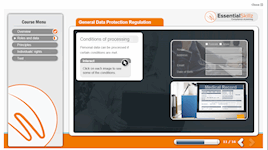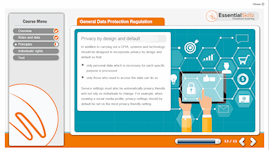General Data Protection Regulation (GDPR)
EssentialSkillz
Summary
Account and Invoice only.
Overview
A GDPR eLearning course outlining the General Data Protection Regulation (GDPR).
The course covers how GDPR is different from the Data Protection Act, what the changes mean for those who process personal data and what is required to remain compliant.
CPD
Course media
Description
An eLearning course outlining the new General Data Protection Regulation. The course covers how GDPR is different from the Data Protection Act, what the changes mean for those who process personal data and what is required to remain compliant.
Summary lesson 1 – Overview:
-
GDPR will replace the EU Data Protection Directive 1995 and the UK Data Protection Act 1998.
-
As a regulation GDPR applies directly and should reduce the level of national data protection variation across member states of the EU.
-
GDPR applies to organisations based in the EU and organisations based outside the EU if they process the personal data of EU residents.
-
GDPR introduces much tougher financial penalties for non-compliance with data protection.
Summary Lesson 2 – Roles and data:
-
You must be familiar with the role you play so that you are aware of your responsibilities under GDPR.
-
Personal data will include location data and online identifiers.
-
If your primary basis for processing personal data is that you have consent, then this consent must be informed, specific and unambiguous.
-
You must obtain an individual’s explicit consent if you wish to process special category data.
-
GDPR highlights the importance of protecting children’s personal data used for online activities.
Summary Lesson 3 – Principles:
-
GDPR principles determine how personal data should be processed.
-
If you process personal data you must comply with these principles.
-
GDPR includes a new accountability principle for data controllers and processors whereby they must be able to demonstrate their compliance.
-
Privacy should be the default and incorporated into the design of systems.
Summary Lesson 4 – Individuals’ rights:
-
Individuals have the right to obtain information from the data controller on how and where their data is being used and for what purpose.
-
The data controller must provide this information free of charge and in a commonly used electronic format.
-
If rights are infringed, individuals can take legal action against data controllers and data processors.
-
GDPR imposes restrictions on the transfer of personal data outside the EU.
Who is this course for?
This course is ideal for all employees who need to know about protecting data within your organisation.
Course Objectives:
- To explain the purpose of data protection.
- To define the terms and principles associated with data protection.
- To help you understand your responsibilities with regard to data protection law and ensure you comply with the law whilst carrying out your everyday duties.
Requirements
Internet Access
Edge or Chrome Browser Recommended
Career path
IT
Data Protection
HR
Questions and answers
Reviews
Currently there are no reviews for this course. Be the first to leave a review.
Legal information
This course is advertised on reed.co.uk by the Course Provider, whose terms and conditions apply. Purchases are made directly from the Course Provider, and as such, content and materials are supplied by the Course Provider directly. Reed is acting as agent and not reseller in relation to this course. Reed's only responsibility is to facilitate your payment for the course. It is your responsibility to review and agree to the Course Provider's terms and conditions and satisfy yourself as to the suitability of the course you intend to purchase. Reed will not have any responsibility for the content of the course and/or associated materials.




